Latest News
US military forces to stay decades in Afghanistan
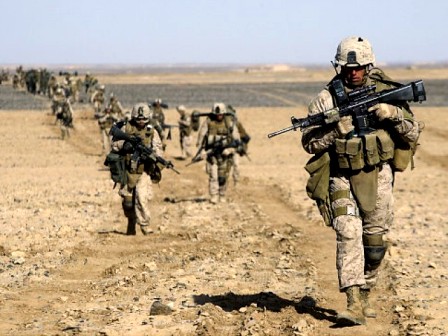
Published by Washington Post
Top U.S. military commanders, who only a few months ago were planning to pull the last American troops out of Afghanistan by year’s end, are now quietly talking about an American commitment that could keep thousands of troops in the country for decades.
The shift in mind-set, made possible by President Obama’s decision last fall to cancel withdrawal plans, reflects the Afghan government’s vulnerability to continued militant assault and concern that terrorist groups such as al-Qaeda continue to build training camps whose effect could be felt far beyond the region, said senior military officials.
President Obama will keep 9,800 troops in Afghanistan through most of 2016
At a news conference Thursday, Oct. 15, President Obama says the U.S. will maintain 9,800 troops in Afghanistan through most of 2016 and will not go down to a normal embassy presence by the end of 2016, but instead will keep 5,500 troops at a small number of bases. (AP)
The new American outlook marks a striking change for Obama, who campaigned on a promise to bring American troops home and has said repeatedly that he does not support the “idea of endless war.” And it highlights a major shift for the American military, which has spent much of the past decade racing to hit milestones as part of its broader “exit strategy” from Afghanistan and Iraq. These days, that phrase has largely disappeared from the military’s lexicon.
In its place, there is a broad recognition in the Pentagon that building an effective Afghan army and police force will take a generation’s commitment, including billions of dollars a year in outside funding and constant support from thousands of foreign advisers on the ground.
“What we’ve learned is that you can’t really leave,” said a senior Pentagon official with extensive experience in Afghanistan and Iraq who like others spoke on the condition of anonymity to describe internal discussions. “The local forces need air support, intelligence and help with logistics. They are not going to be ready in three years or five years. You have to be there for a very long time.”
Senior U.S. commanders have also been surprised by al-Qaeda’s resilience and ability to find a haven in the Afghan countryside, as well as the Taliban’s repeated seizure of large tracts of contested territory.
[Pentagon has new authority to strike Islamic State in Afghanistan]
In November, the U.S. military sent a company of elite U.S. Rangers to southeastern Afghanistan to help Afghan counterterrorism forces destroy an al-Qaeda training camp in a “fierce fight” that lasted for several days.
The training camp was “absolutely massive,” said Brig. Gen. Wilson Shoffner, a military spokesman in Afghanistan.
“No matter what happens in the next couple of years Afghanistan is going to have wide ungoverned spaces that violent extremist organizations can take advantage of,” Shoffner said. “The camp that developed in southeastern Kandahar is an example of what can happen.”
There are now 9,800 U.S. troops in Afghanistan, some of them advising local forces and some focused on hunting down al-Qaeda and other hard-line militants. Plans call for Obama to halve that force by the time he leaves office, but he could defer the decision to the next president.
The U.S. military’s current thinking reflects its painful experience in Iraq, where Iraqi army forces collapsed less than three years after American forces left in 2011.
And it’s echoed in the arguments made by many Republican and Democratic foreign policy advisers, looking beyond the Obama presidency, for a significant long-term American presence. “This is not a region you want to abandon,” said Michèle Flournoy, a former Pentagon official who would probably be considered a top candidate for defense secretary in a Hillary Clinton administration. “So the question is what do we need going forward given our interests?”
[Taliban is targeting Afghan cities]
In Helmand province, where American troops suffered the heaviest losses of the war, Afghan units have struggled to hold on to territory taken by American forces from the Taliban in 2011 and 2012. “There’s a real will-to-fight issue there,” said a senior military official in Kabul.
Senior American commanders said that the Afghan troops in the province have lacked effective leaders as well as the necessary weapons and ammunition to hold off persistent Taliban attacks. Some Afghan soldiers in Helmand have been fighting in tough conditions for years without a break to see family, leading to poor morale and high desertion rates.
Gen. John F. Campbell, the top American commander, has sent Special Operations forces to the province to help direct American airstrikes and provide help with planning. An American soldier was killed and two others were wounded this month fighting alongside the Afghans.
In addition, about 300 U.S. troops in Helmand are advising Afghan commanders at the corps level, well removed from the front lines.
The American support is designed to arrest the immediate losses, but building an effective and sustainable fighting force that can manage contested areas such as Helmand province, will take many years, U.S. military officials said.
Foreign officials say the Afghan units lack effective mid-level officers and sergeants who can lead troops in combat and are not captive to patronage networks that dominate the country and sap soldier morale. Seeding the force with mid-level officers often requires bringing in young leaders from outside the current system and training them from scratch.
“I think a generational approach has value,” Shoffner said.
Senior U.S. officials point to improvements in areas such as evacuating wounded troops from the battlefield. As recently as 2013, it took the Afghan army 24 hours on average to get medical assistance to wounded troops. Now help usually arrives in four hours, still longer than desired. But other critical goals, such as building an effective resupply system for the country or a capable air force, cannot be accomplished in a few years. Many of the American pilots flying in Afghanistan have 10 to 15 years of experience.
“How long does it take to grow a 15-year pilot? It takes about 15 years,” Shoffner said. “We’re starting a little late with the air force.”
Senior U.S. military officials and some former Obama administration officials increasingly compare the U.S. government’s plans for Afghanistan to its approach to South Korea, where it has maintained tens of thousands of troops for decades. Other top officials cite the example of Colombia, where the United States has long provided training, money and contractors.
[The war in Afghanistan is turning even more chaotic. Read these stories to catch up.]
“Our presence right now helps serve as a significant bulwark against instability and at a cost that I think is reasonable to bear,” said Daniel Feldman, who until recently served as the Obama administration’s special representative for Afghanistan and Pakistan. “Particularly if we’re not proposing a significant combat role, I think the American people would be open to the argument of sticking with Afghanistan.”
U.S. officials said that in Afghan President Ashraf Ghani they have a willing and reliable partner who can provide bases to attack terrorist groups, not just in Afghanistan but also throughout South Asia, for as long as the threat in the chronically unstable region persists.
The difference between Afghanistan and other long-term American commitments in South Korea and Colombia is that Afghanistan remains a far more dangerous and unstable place for American personnel. Even though Afghan troops have assumed the lead combat role throughout the country, with U.S. troops in an advisory role, Americans still face real dangers and have taken recent casualties there.
In some cases, senior U.S. officials have been surprised by the Taliban comeback in the past year. Emboldened by the departure of most foreign forces, Taliban fighters have seized district centers, inflicted heavy losses on government forces and temporarily overrun a provincial capital. Now, Afghan forces must also grapple with an aggressive local branch of the Islamic State.
Some officials hold out hope that a long-term military presence might be unnecessary, if hoped-for peace talks with the Taliban make progress. The Afghan government has asked Pakistan, home to many Taliban leaders, to push the militants into talks.
A generational U.S. footprint “doesn’t need to be the case,” said Jeff Eggers, a former senior White House official with long experience working on Afghanistan and Pakistan. “The Korea model is not necessary if the peace process moves forward — that’s the preferred path for all parties.”
The obstacles to peace talks, though, are huge. Senior officials in Kabul and Islamabad, Pakistan, are riven by suspicion, and the Taliban remains deeply fractured following the revelation that its longtime leader, Mohammad Omar, has been dead for more than two years.

Latest News
Japan maintains direct contacts with IEA officials through Kabul Embassy
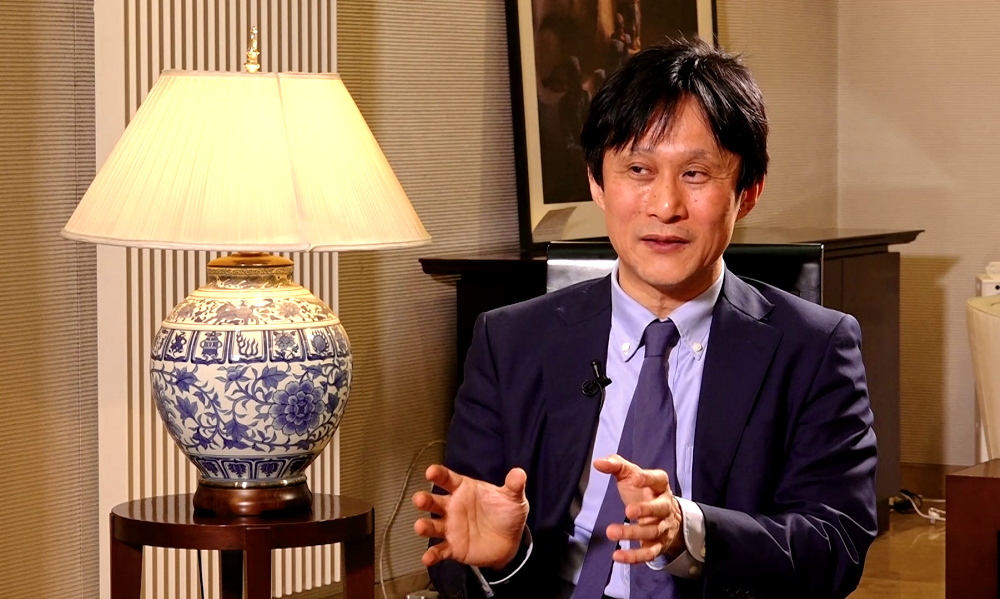
Japan continues direct communications with Islamic Emirate officials through its Kabul embassy, despite the lack of formal diplomatic relations, Kenichi Masamoto, Japanese Ambassador to Kabul, told Ariana News in an exclusive interview.
Masamoto noted that no final decision has yet been made regarding the future of Afghanistan’s embassy in Tokyo.
“At present, there are no official diplomatic relations, and certain restrictions exist,” he said. “However, we are working to find appropriate channels for dialogue and engagement. The Afghan Embassy in Tokyo had been managed by diplomats of the former government appointed under the previous Republic. Following discussions with Japanese authorities, it was agreed that the embassy would close at the end of January, and this has now been completed. No final decisions have been made regarding future arrangements.”
The ambassador emphasized that progress in the Doha process could help end Afghanistan’s isolation and open the door to broader international engagement with the Islamic Emirate. “As a member of the international community, this process will also create more opportunities for Japan to engage with Afghanistan,” he said.
Masamoto stressed the international community’s concern over the ongoing suspension of secondary and higher education for girls, noting that Japan shares this concern. “Girls’ education is critical for Afghanistan’s future. This is not only the position of the international community—it is also in the best interest of Afghanistan’s future. The international community wants this suspension to end as soon as possible,” he said.
Despite these challenges, Japan will continue to support the Afghan people, focusing on humanitarian aid and the provision of basic needs through the United Nations. The ambassador highlighted that Tokyo has stood by the Afghan people during difficult times and will continue to do so.
The Afghan Embassy in Japan officially closed at the end of January 2026.
Latest News
Afghanistan’s security is security of region and world: Haqqani
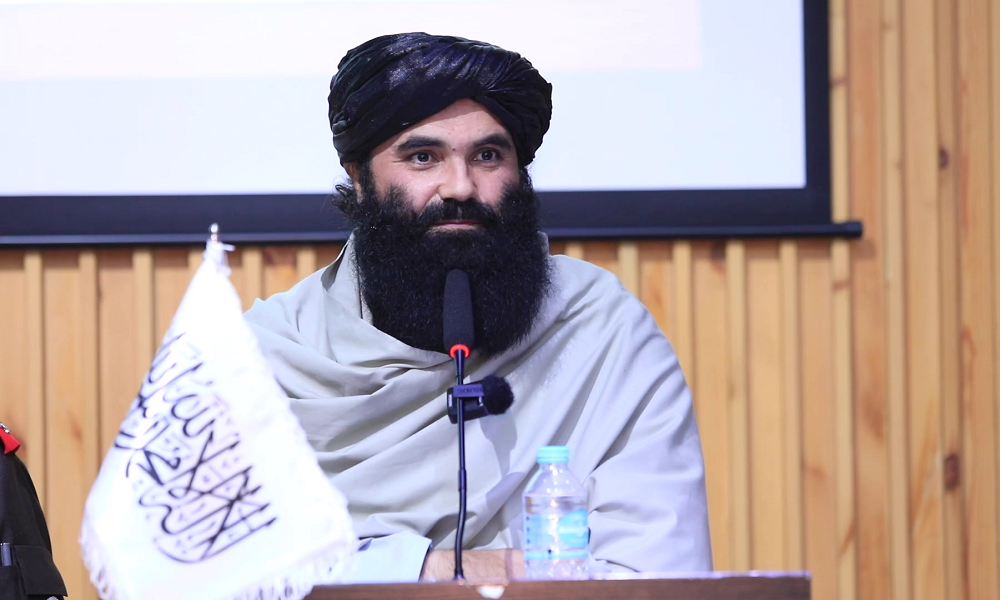
Khalifa Sirajuddin Haqqani, Minister of Interior Affairs, says the officials of the Islamic Emirate have repeatedly emphasized that the security of Afghanistan is the security of the region and the world.
Speaking at the graduation ceremony of the sixth professional police course, Haqqani stated that insecurity in the region is insecurity for the entire world.
He added: “Neighbors, the region, and the world must adopt strategies and policies that contribute to the stability of Afghanistan.”
Addressing the police officers, Haqqani said: “The foundation of this system was built on piety and sacrifice. Instead of promoting oneself, all attention should be given to the values of the system.”
He advised them: “We should raise our ethical capacity to such a level that our ethics influence the areas related to our duties.”
He further stated that officers equipped with Islamic belief and professional training are capable of providing valuable services to the people.
The Minister of Interior Affairs emphasized the role of the police in maintaining security, preventing crime, and strengthening the system, adding that the professionalization of the police is of fundamental importance for the country’s stability.
Sirajuddin Haqqani described the qualities of an Islamic police officer as piety, professionalism, and dedication, stressing that ensuring security is only possible through professional and disciplined police.
He also noted that education and ethical standards must be prioritized, because the improper behavior of individuals can damage the public’s trust in the system.
He urged the police to, with piety, good conduct toward the people, and law enforcement, uphold the principles of public service in their work, so that the trust and cooperation of the people are further strengthened.
Latest News
UN warns mass return of Afghans from Pakistan and Iran is pushing Afghanistan to the brink

The mass return of Afghans from neighboring Pakistan and Iran is pushing Afghanistan to the brink, the U.N. refugee agency warned on Friday, citing an unprecedented scale of population movement.
According to UNHCR’s representative in Afghanistan, Arafat Jamal, 5.4 million Afghans have returned since October 2023, the vast majority from Pakistan and Iran. Speaking to reporters in Geneva via video link from Kabul, he said the pace of returns is overwhelming.
“This is massive, and the speed and scale of these returns has pushed Afghanistan nearly to the brink,” Jamal said.
The surge began after Pakistan introduced a sweeping crackdown in October 2023 targeting undocumented migrants, prompting many Afghans to leave voluntarily or face detention and deportation. Iran also tightened measures against migrants at roughly the same time.
Many of those returning had spent decades in exile — some born and raised in Pakistan with established businesses and family networks.
Last year alone, 2.9 million Afghans returned, marking the highest annual return to any single country ever recorded by UNHCR.
Jamal noted that Afghanistan was already grappling with a severe humanitarian crisis, economic fragility, and restrictions affecting women and girls. The sudden arrival of returnees — equal to about 12% of the population — has further strained services and resources. About 150,000 people have returned since the start of 2026.
Afghan authorities distribute basic assistance packages — including food, cash, SIM cards, and transport — but needs far exceed available support, particularly in a country still reeling from drought and two major earthquakes.
A November assessment by the UN Development Programme (UNDP) found that nine in ten families in high-return areas were resorting to negative coping mechanisms such as skipping meals, taking on debt, or selling their belongings.
Jamal also voiced concern about long-term sustainability, noting that while 5% of returnees say they plan to leave Afghanistan again, more than 10% know someone who already has.
“These decisions, I would underscore, to undertake dangerous journeys, are not driven by a lack of a desire to remain in the country, on the contrary, but the reality that many are unable to rebuild their viable and dignified lives,” he said.
-

 International Sports5 days ago
International Sports5 days agoIPL 2026: Franchise sales gather pace as global investors circle teams
-

 Sport3 days ago
Sport3 days agoAfghanistan’s semi-final hopes hang in the balance after two T20 World Cup defeats
-

 Business5 days ago
Business5 days agoUzbekistan approves feasibility study agreement for Trans-Afghan Railway
-
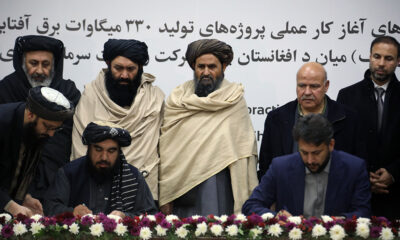
 Business4 days ago
Business4 days agoAfghanistan signs 845MW Power deal with Azizi energy; Baradar meets company Chief to advance investment plans
-

 International Sports4 days ago
International Sports4 days agoAFC Champions League Elite delivers key results as race for knockout stage intensifies
-

 International Sports5 days ago
International Sports5 days agoWinter Olympics: Milan action continues with packed schedule on Tuesday
-

 Latest News5 days ago
Latest News5 days agoDoha process private sector meeting highlights growth and coordination in Afghanistan
-
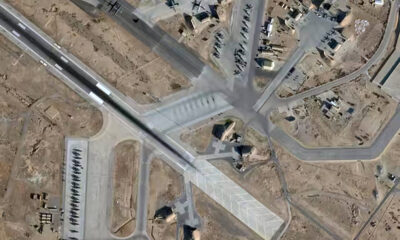
 Regional4 days ago
Regional4 days agoUS used mobile launchers for missiles at Qatar base as Iran tensions rose, satellite pictures show














